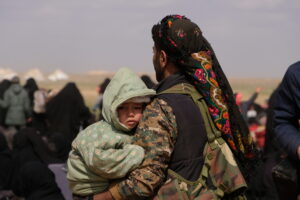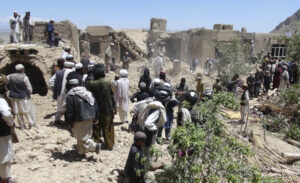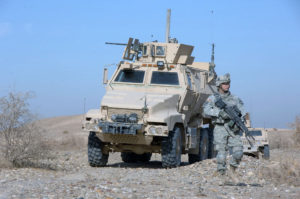Overreach
A new book is arguably the best account of what went wrong with the project to turn Baathist Iraq into a liberal democracy, but flawed by the insistence that failure was inevitable due to Iraq's sociopolitical realities. Photo by Harvard University Press
Photo by Harvard University Press
Photo by Harvard University Press
| To see long excerpts from “Overreach” at Google Books, click here. |
“Overreach: Delusions of Regime Change in Iraq” A book by Michael MacDonald
Michael MacDonald’s “Overreach: Delusions of Regime Change in Iraq” is arguably the best panoptic account of what went wrong with the U.S.-led project to turn Baathist Iraq into a liberal democracy. Pity, then, that the author should belittle the role of human agency — whether that of Americans or Iraqis — after the launch of this historic venture, and insist that its failure was inevitable due to Iraq’s sociopolitical realities.
For MacDonald, a professor of international relations at Williams College and the author of a book on South Africa and another on Northern Ireland, those who blame the Iraq debacle on the Americans’ bungled postwar administration of the country or various Iraqi factions’ violent sectarianism miss the point; the situation couldn’t have turned out otherwise. The real mistake, he maintains, was buying into the unrealistic notion that “a society that lacked a tradition of the rule of law, an independent middle class, and a market economy, liberal social practices and values, or consensus about the common purposes that unite the people who live in Iraq” would segue to a liberal capitalist democracy with the removal of Saddam Hussein’s regime.
Yet MacDonald concedes that most neoconservatives remained immune to this comfortable and self-serving axiom characteristic of so many Western liberals. Unlike other proponents of regime change, “[n]eoconservatives called for conquering Iraq and then using the state to transform the culture.” Ironically then, the author himself highlights the crippling flaw of “Overreach”: his unwillingness to delve into the neocons’ particular conception of how to democratize Iraq and speculate as to whether that approach could have provided a viable alternative to the road taken.
MacDonald argues quite convincingly that, even with the influence of other factors (for example, the oil and pro-Israel lobbies, and the U.S. president’s personal predispositions), the George W. Bush administration’s main reason for invading Iraq was its burning desire to replace the Baathist police state with a liberal democracy. (He believes the administration used Iraq’s alleged possession of weapons of mass destruction and its supposed link to the 9/11 terrorist attacks as excuses to win domestic and international support.) The author also points out that Bill Clinton had set regime change as the goal during his tenure as president, but did little to pursue it.
Why did the Bush administration and so many Republicans and Democrats want to turn Iraq into a liberal democracy? Because of the then-popular — and, in MacDonald’s view, irrational — conceit that U.S. geostrategic interests (including an Iraq that is pro-American, anti-Iranian, not hostile to Israel, and open to business with all kinds of American firms) are best served by spreading America’s philosophical ideals, which are supposedly universal in nature. The author makes a compelling case that those who claim that the U.S. assigned little importance to the issue of democracy until after it failed to locate WMDs and needed a new focus (this reviewer was one such person for a time) get it wrong. “The United States went to war,” he maintains, “because they saw liberalism as the answer to Iraq’s problems and because they expected that most Iraqis would understand that liberal values, which would fit naturally in Iraq, would emancipate them.”
MacDonald, who likes to analyze contemporary politics in line with paradigms drawn up by political theorists of yore, identifies a curious trait among people who, wanting to go beyond merely decapitating the Iraqi regime, sought a liberal capitalist democracy in Iraq: They espoused (sometimes unwittingly) a Lockean vision of state and society. John Locke conceived of the state as enforcing a natural law that most people already accept, thanks to their God-given ability to reason. Thus, a society-of-sorts bound by an unwritten compact precedes the establishment of the state. MacDonald claims that all advocates of regime change “except for the more astute neoconservatives” adopted this Lockean view, and consequently “thought they were freeing Iraqi society to realize the liberal rights that were buried inside it.” They perceived no danger in dismantling the Iraqi state by disbanding the army and launching a de-Baathification drive, because in their minds Iraqis were a cohesive lot with shared interests and aspirations.
What happened next, the author observes, didn’t recall Locke so much as Thomas Hobbes, who maintained that the state (as opposed to nature) is the source not only of order but of law itself. Without a state to formulate the law, humans inhabit a violent free-for-all in which everyone fights everyone else. But Hobbesian Iraq included a twist. MacDonald points out that instead of every man fending for himself, people gravitated to their sectarian communities for protection, thereby endowing them with a political dimension.
Although this analysis doesn’t give ideological (Islamic) extremism its due, it is otherwise accurate. Nevertheless, a few questions come to mind. What if the movers and shakers in the Bush administration had concurred with the neocons that the onus is on the state to foster liberalism? It stands to reason that they wouldn’t have allowed Paul Bremer, who governed Iraq for a year, to dismantle it. And what if they’d heeded the neocons’ call for the U.S. to assume the task of shaping Iraq’s politics and even culture? Presumably, they wouldn’t have granted Iraq self-rule just one year into the occupation, but rather continued to administer the country directly until they achieved their far-reaching objectives. And here’s a thought: If, for whatever reason, you’re in a rush to facilitate representative democracy in a country characterized by sectarian and ethnic divisions, be sure to enact measures that restrict the communal majority’s ability to run roughshod over minorities. MacDonald himself concedes that in Iraq, reducing democracy to the matter of representation simply meant that Shiites, who won the civil war pitting them against Sunni Arabs, also win parliamentary elections and can at any time field a government that “presents sectarian hegemony as democracy.”
On a related issue, the author remarks that “institutions, if they are to be real, bind, thwart, and entangle rulers.” But he doesn’t add that, in order to establish such institutions and ensure their robustness, the U.S. should have governed Iraq directly for much longer than it did. Precisely because they knew they’d eventually leave the country, the Americans would have likely behaved in the desired disinterested fashion. Was it realistic, on the other hand, to expect someone such as former Shiite premier Nouri al-Maliki to limit his and his community’s ascendant power after decades of marginalization?
In an apparent nod to political correctness, MacDonald declares: “Many Iraqis wanted rights, constitutional government, and political toleration.” The caveat is that “wanting them and achieving them in the absence of traditions of individualism, secularism, capitalism, instrumental rationality, and hard-won consensus on national purposes and identities are two different things.”
What about what the U.S. did in West Germany and Japan after World War II? Ah, but those countries differed from Iraq, you say. Yes, they did — but they also differed from each other. You can claim that Germany had had some experience with (a weak and ineffective) democracy during the Weimar period, but Japanese history featured nothing comparable. That the United States, in concert with local liberals and with help from outside powers, succeeded in turning two distinct totalitarian and jingoistic states into liberal capitalist democracies (simultaneously, no less) undermines MacDonald’s assertion that an undertaking of a similar kind in Iraq was doomed to failure.
This brings us to the real problem with the Iraq regime-change enterprise, which MacDonald only touches on: It was an imperialist project in an age inimical to imperialism, undertaken in large part by people loath to acknowledge it as such and consequently unwilling to shoulder their responsibilities in full. The Americans did little to mold Iraqi culture, oversee the new educational system and establish institutions that foster liberal democracy. They contented themselves with removing a murderous dictator, dismantling the state he had presided over without immediately replacing it, fighting the resulting largely Sunni insurgency, birthing a strictly representative democracy that granted the majority Shiite community unfettered political power, committing the occasional war crime, and then departing and abandoning to near-certain death thousands of Iraqis who worked with them (as documented by Kirk W. Johnson in his book “To Be a Friend Is Fatal: The Fight to Save the Iraqis America Left Behind”). Add to all this the fact that many Iraqi Sunnis and Shiites resorted to violence to settle scores with each other, annihilate non-Muslim minorities or stymie the Americans, and the result is what we see today.
There’s no telling whether liberal democracy in Iraq would have spread to other countries of the region, as the neocons believed. What remains certain, however, is that such an outcome in Iraq would have served Iraqis better than Saddam’s repressive, bloody and at times genocidal rule, as well as the current mess in which an extremist Sunni insurgency battles a sectarian Shiite state. The claim that this third way was impossible to forge is not only profoundly cynical, but at variance with historical examples of relatively recent vintage. Had MacDonald limited himself to explaining why the liberal democracy project in Iraq failed and refrained from insisting that it was bound to, the question of how things might have turned out had the neocons gotten their way wouldn’t loom over his analysis. And “Overreach” would have emerged a less ambitious but far more potent work.
Rayyan Al-Shawaf is a writer and book critic in Beirut.
Your support matters…Independent journalism is under threat and overshadowed by heavily funded mainstream media.
You can help level the playing field. Become a member.
Your tax-deductible contribution keeps us digging beneath the headlines to give you thought-provoking, investigative reporting and analysis that unearths what's really happening- without compromise.
Give today to support our courageous, independent journalists.






You need to be a supporter to comment.
There are currently no responses to this article.
Be the first to respond.